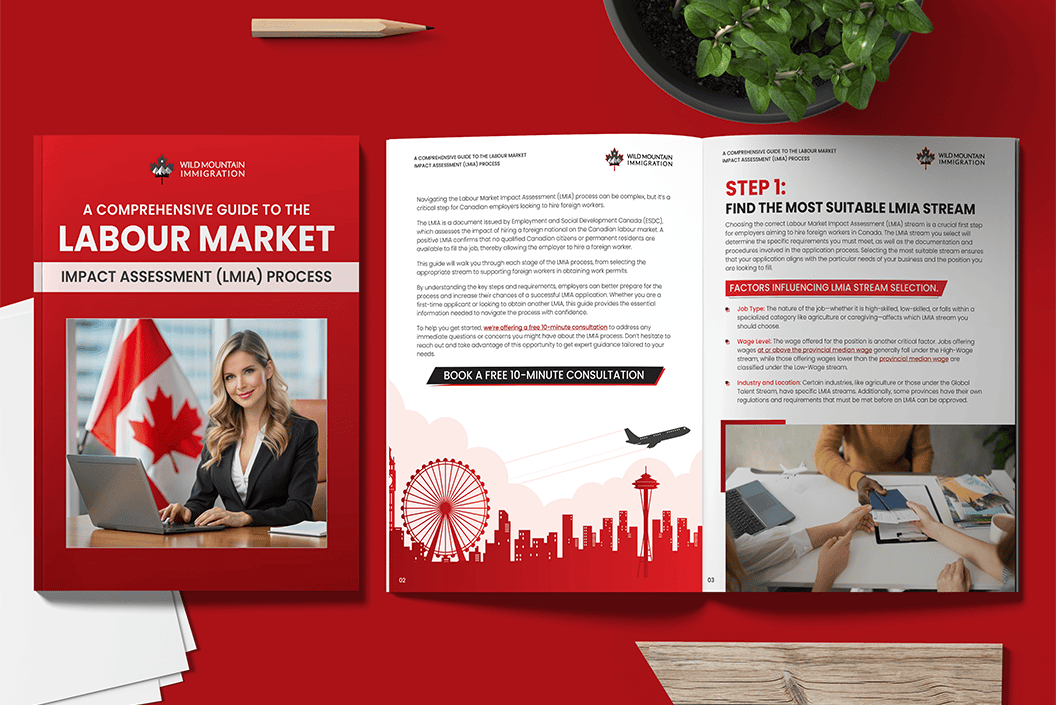Before you hire foreign workers, an employer in Canada may need to obtain a Labour Market Impact Assessment (LMIA).
A positive LMIA shows that a foreign worker is required to fill the position. This will show that no citizens or permanent residents in Canada can fill the vacancy.
If an employer required a LMIA, they must submit an application for one.
After the employer obtains an LMIA, the employee can apply for a work permit.
Table of contents
Agricultural Stream overview
Employers may hire Temporary Foreign Workers (TFWs) in the Agricultural Stream if Canadian and permanent residents are not available.
To be eligible for this stream, employers must meet these two criteria:
- production must be in specific commodity sectors, and
- the activity must be related to on-farm primary agriculture
National commodity sectors
- Apiary products
- Fruits, vegetables (including canning/processing of these products if grown on the farm)
- Mushrooms
- Flowers
- Nursery-grown trees including Christmas trees, greenhouses/nurseries
- Pedigreed canola seed
- Seed corn
- Grains
- Oil seeds
- Maple syrup
- Sod
- Tobacco
- Bovine
- Dairy
- Duck
- Horse
- Mink
- Poultry
- Sheep
- Swine
On-farm primary agriculture
Primary agriculture is any work that involves:
- performed within a farm, nursery or greenhouse
- be consistent with one of these National Occupational Classification codes: 0821, 0822, 8252, 8255, 8431, 8432, and 8611
- involve at least one activity, such as:
- operation of agricultural machinery
- boarding, care, breeding, sanitation or other handling of animals, other than fish, for the purpose of obtaining raw animal products for market
- collection, handling and assessment of those raw products, or the planting, care, harvesting or preparation of crops, trees, sod or other plants for market
Employers who apply for an Agricultural Stream LMIA can request an employment duration of 2 years.
An employment period of up to 2 years applies to low-wage jobs, with the employer’s reasonable job requirements determining the length.
Employers applying for an Agricultural Stream LMIA for a high-wage job may request an employment duration of up to 3 years. The employer’s reasonable employment demands must be satisfied by the employee’s employment duration.

Download Your Free LMIA Process Guide
Our guide offers clear, step-by-step instructions to help you avoid common pitfalls and increase your chances of approval.
Program requirements
Processing fee
The LMIA processing fee does not apply to occupations related to primary agriculture and positions under the National Occupational Classification codes: 0821, 0822, 8252, 8255, 8431, 8432, and 8611
Transportation
Employers are responsible for paying for the round-trip transportation costs (for example, plane, train, boat, car, bus). These fees must be paid up-front by the employer to avoid being included in any discussions about the employment contract. This procedure helps safeguard TFWs who may be offered alternative travel arrangements in exchange for a job offer.
Employers must maintain records (such as invoices, receipts, flight itineraries, tickets, boarding passes) for a minimum of 6 years documenting all travel expenses paid. Employers may need this information as supporting documentation when applying for a subsequent LMIA or if they are randomly selected for an inspection.
Note: An employer cannot recover the transportation costs from a TFW under any circumstances.
Day-to-day transportation
Employers must provide free transportation to and from the on-site/offsite housing location to the work site for TFWs, as required.
Housing
Employers must offer TFWs with decent, appropriate, and low-cost housing as defined by the Canadian Mortgage and Housing Corporation. The housing can be either on-farm, like a bunkhouse, or off-site in a commercial establishment. Employers must not allow more people to occupy an accommodation than the maximum occupancy permitted.
They must also ensure that sufficient housing will be made available for all TFWs per approved accommodations, from the date of arrival to departure.
Employers supplying:
On-farm housing
- The TFW's employer can deduct no more than $30 per week (pro-rated for partial weeks) from the employee's wages unless Provincial/Territorial Labour Standards limit this deduction to a lower amount.
Off-site housing - lower-skilled workers
- The TFW's employer can deduct no more than $30 per week (pro-rated for partial weeks) from the employee's wages unless Provincial/Territorial Labour Standards limit this deduction to a lower amount.
Off-site housing - higher-skilled workers
- The TFW's rent should not exceed 30% of their gross monthly earnings.
If there are multiple TFWs living in a home that is leased or owned by the employer, the employer must calculate the rent at market rate. The rent should be shared equally among all TFWs.
Note: The TFW is not required to stay in the workplace’s housing and may elect to depart for private accommodation if desired. The departure date, on the other hand, may need to be notified to the employer or business institution in advance by the TFW.
Housing inspection
Employers that wish to house workers on farms or at remote locations must produce evidence of inspection by the appropriate provincial, territorial, or municipal government agency, or a valid private inspector with appropriate certification. If the official housing inspection report does not have a standard form, employers must make sure that Schedule F – Housing inspection report seasonal agricultural worker program and agricultural stream is used to report the results of the inspection.
If you cannot meet the requirements for the housing inspection report, your LMIA application will be considered incomplete.
While a housing inspection report marked “pass with conditions” can still be used to processing an LMIA application, no decision will be made until the employer provides proof that all issues on the report have been resolved.
Employers are responsible for any labor or inspection fees that may be incurred as a result of the housing being examined. Employers are not allowed to recover these costs from the TFW under any circumstances.
If you need more information about the housing inspection. You can find it here.
Health insurance
Employers must cover the costs of health insurance for their employees. The TFW’s health insurance coverage must start from the moment they arrive in Canada until they are enrolled in a provincial or territorial health care plan. The waiting period for each province or territory’s health insurance is available on the Ministry of Health’s websites. The TFW’s private insurance must be comparable to the territorial/provincial health coverage plan.
Note: The TFW is prohibited from reimbursing the employer for health insurance premiums under any circumstances.
Workplace safety
Employers must always verify that the TFWs they seek to hire under the TFW Program are covered by their province’s or territory’s workplace safety insurance provider, as required by law. Employers who operate in provinces/territories where the provincial/territorial legislation allows them to select a private insurance plan must comply with the following conditions:
- that the private health insurance plan you choose gives the same coverage as what is offered by your province or territory
- that all employees on the worksite have the same health insurance provider
Employers looking for a private insurance plan equivalency should contact the provincial or territorial workplace safety authority.
The employer’s insurance coverage must match the TFWs’ first day of work in Canada, and the costs associated with this insurance cannot be charged to the employees.
Pesticides and chemical use
Employers who use pesticides or other hazardous chemicals must follow provincial/territorial regulations. Workers must be informed of pesticide and chemical applications, as well as given the following:
- free protective equipment
- appropriate formal and informal training
- supervision where required by law
Employment contract
An employment contract must be prepared and signed by the employer. If any disagreements or problems should come up between the employer and the temporary foreign worker, this contract will serve as a resolution guide. If the employer and employee cannot resolve the conflict, they may contact their provincial or territorial Ministry of Labour.
Business legitimacy
As part of the application for a Labour Market Impact Assessment, all employers seeking to hire through the Temporary Foreign Worker Program must provide documentation demonstrating that their business and job offer are legitimate.
Paid representatives
In order to represent or assist employers in exchange for compensation, individuals must be authorized under section 91 of the Immigration and Refugee Protection Act (IRPA). This means they have to be a member who is currently in good standing with one of the following:
- a Canadian provincial/territorial law society, or a student-at-law under its supervision
- the Chambre des notaires du Québec
- the Province of Ontario’s law society as a paralegal
- the Immigration Consultants of Canada Regulatory Council (ICCRC)
To confirm that a specific individual is able to represent you or provide immigration advice, employers should visit Immigration, Refugees and Citizenship Canada (IRCC).
Wages, working conditions and occupations
You must offer temporary foreign workers the same compensation and benefits as Canadian and permanent resident employees working in the same occupation. Furthermore, any temporary foreign worker in a union must receive the wage set under the bargain agreement.
If you want to bring in foreign non-livestock high-skilled workers, you must check the Streams for High-wage or Low-wage positions to determine the wage.
You must agree to review and adjust the wage of the temporary foreign worker to ensure it meets or exceeds, at all times, the wage rates outlined in the wage tables, or applicable federal/provincial/territorial minimum wage rates, whichever is higher.
Wages by agricultural commodity
Click on the commodity to see the wage table.
- apiary products
- fruits, vegetables (including canning/processing of these products if grown on the farm)
- mushrooms
- flowers
- nursery-grown trees including Christmas trees, greenhouses/nurseries
- pedigreed canola seed
- seed corn
- grains
- oil seeds
- maple syrup
- sod
- tobacco
- bovine
- dairy
- duck
- horse
- mink
- poultry
- sheep
- swine
Recruitment and advertisement
Starting January 12, 2022 and continuing until June 30, 2023, Employment and Social Development Canada will not impose minimum advertising requirements on employers applying for a Labour Market Impact Assessment (LMIA) to employ foreign temporary workers in primary agriculture.
Employers do not need to follow the Temporary Foreign Worker Program’s minimum advertising requirements or submit documentation supporting their application when applying for a Labour Market Impact Assessment.
Apply for a Labour Market Impact Assessment
Employers who want to hire a temporary foreign worker under the Agricultural Stream must submit an application for a Labour Market Impact Assessment along with all required supporting documentation to Employment and Social Development Canada/Service Canada.
Employers submit evidence of how a TFW would impact the Canadian job market in order to receive an assessment. You need to apply with all of the applicable submitting documentation. It is critical that employers take all the required steps and submit any needed documentation, and that all supporting documents submitted are filled out correctly.
Apply via LMIA Online portal
You need a Job Bank user account to log in and access LMIA Online. If you’re an employer, you may also need a third-party account for authentication purposes.
Complete your one-time registration in Job Bank for Employers by clicking on the link below and following the instructions.“Don’t have an account? Sign up now.” button.
It will take around 10 minutes to complete the registration procedure.
After you create your Job Bank account(s), you can complete an LMIA application on the LMIA Online Portal.
Steps after receiving a Positive LMIA
The employer will be notified of the LMIA application’s approval in a letter. This positive LMIA will be valid for 18 months from the date of issue.
The letter will not include the names of the TFWs for privacy reasons.It includes information on the job offer, such as pay, working conditions, and employment categories.The names of the workers will appear in Annex B, which is only for employer records and not to be shared with potential employees as it not required when applying for a work permit.
After the employer obtains a positive LMIA letter, they are responsible for:
- sending a copy of this letter, as well as the employment agreement, signed by the employer, to the TFW.
- ask the TFW to apply to IRCC for a work permit. With the work permit application, the TFW must include a copy of both the positive LMIA letter and employment contract that has been signed by both employer and employee.
Nicola Wightman
Nicola Wightman is a regulated Canadian Immigration Consultant (RCIC) under the College of Immigration and Citizenship Consultants (CICC). Her professional immigration consultant number is R706497.
Immigration options
Start Your Canadian Immigration Journey
Our experts make the process clear, stress-free, and successful, so you can move forward with confidence and focus on what matters most.

Get Started Today
"*" indicates required fields


